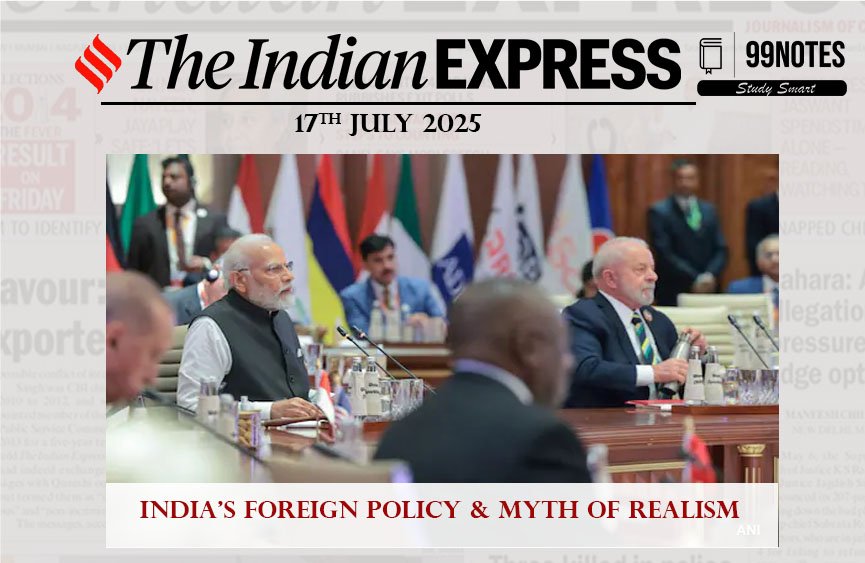17 July 2025: Indian Express Editorial Analysis
1. A World of Our Making
(Source: Editorial Page, The Indian Express)
| Topic: GS2 – International Relations, Foreign Policy, India and Its Neighborhood, Global Governance |
| Context |
|
Current State of Indian Foreign Policy
-
Hyper-nationalism as a barrier:
India’s foreign policy is heavily influenced by populist narratives and nationalistic rhetoric, which prioritize optics over substance. Instead of addressing strategic vulnerabilities, policymakers often focus on media-driven headlines. -
Lack of Realism:
The editorial highlights a refusal to embrace “true realism,” which means recognizing India’s structural weaknesses and recalibrating goals accordingly. Diplomatic triumphs are often exaggerated, creating a distorted self-image.
Challenges in Strategic Engagement
-
Loss of Moral Authority:
India historically claimed moral high ground in global forums. However, recent inconsistencies—such as ambiguity on human rights issues and selective condemnation—have eroded credibility. -
Nuclear Posture and Escalatory Dynamics:
Both India and Pakistan rely on nuclear deterrence but lack robust mechanisms to prevent accidental escalation. The absence of clear communication channels amplifies the risk of confrontation. -
Diplomatic Isolation and Misplaced Priorities:
India tends to externalize crises, portraying them as global issues while framing them narrowly in domestic narratives. This selective engagement undermines India’s diplomatic effectiveness in forums like the UN and global governance bodies.
Misinterpretation of Realism
-
Realism vs. Populism:
India’s foreign policy establishment often mistakes populist actions (e.g., aggressive rhetoric or strong responses in neighborhood disputes) for strategic realism. True realism demands aligning national ambitions with actual capabilities. -
Impact on Global Standing:
Such missteps lead to India being perceived as reactive rather than proactive, which limits its ability to shape international norms, trade negotiations, and security frameworks.
Broader Implications
-
Security Risks:
Failure to engage constructively with neighbors and global powers creates vulnerabilities—especially as India faces an assertive China and volatile regional geopolitics. -
Credibility Deficit:
When India avoids transparency or adopts inconsistent stances, it undermines trust among allies and partners. This makes coalition-building harder in multilateral forums.
Conclusion and Way Forward
India’s foreign policy must transition from symbolism to substance. A realistic approach requires:
-
Institutionalizing strategic planning through bipartisan consensus.
-
Strengthening crisis management mechanisms, particularly on nuclear stability.
-
Rebuilding moral credibility by aligning actions with stated democratic values.
-
Proactively shaping global governance frameworks rather than reacting to crises.
India’s rise on the global stage cannot rely on optics alone; it must be anchored in pragmatic diplomacy and sustained engagement.
Conclusion:
The Balasore incident underscores that legal frameworks alone cannot ensure justice without institutional sensitivity and accountability. India needs to move beyond symbolic compliance toward robust, empathetic systems that protect dignity and safety. When women speak up, the system must listen and act decisively.
| Practice Question: (GS-2 | 15 Marks | 250 Words)
“India’s foreign policy often confuses hyper-nationalism with strategic realism, weakening its global influence.” Critically analyze with recent examples. |
Also Read: The Hindu Editorial Analysis- 17 July 2025
2. Appointment By Chance
(Source: Editorial Page, The Indian Express)
| Topic: GS2 – Issues Relating to Education, Governance, and Transparency GS1 – Social Issues: Education and Inequality |
| Context |
|
Structural Issues in Bihar’s Higher Education
-
Crippling Institutional Framework:
Bihar’s higher education system suffers from decades-long decay caused by nepotism, caste-based favoritism, and political interference. Institutions are dominated by labharthi politics where appointments are influenced by vested interests rather than merit. -
Impact on Quality Education:
Irregularities in teacher recruitment, combined with recruitment delays, have eroded trust in state-run universities. The teacher-student ratio stands at an alarming 1:50, and in some postgraduate departments, one teacher caters to 200–350 students.
Lottery System: A Flawed Solution
-
Mismatch in Expertise:
The lottery-based approach has resulted in bizarre appointments such as a chemistry professor heading an arts-oriented college and history professors leading science colleges, showing that randomization undermines institutional functioning. -
Illusion of Neutrality:
While presented as a way to eliminate favoritism, this arbitrary mechanism reduces a vital administrative position to sheer chance. The editorial emphasizes that governance reform must focus on transparency, meritocracy, and structural accountability, not on quick fixes.
Broader Consequences
-
Erosion of Academic Standards:
Dilapidated conditions in institutions like BN Mandal University, with shared classrooms and overcrowding, depict the crisis. Students increasingly resort to coaching centers for competitive exams rather than attending college. -
Exodus and Migration:
Failure to ensure quality education has pushed Bihar’s youth to migrate, worsening the state’s socio-economic challenges and perpetuating the poverty trap.
Alternatives for Reform
-
Institutional Transparency:
Adopt measures similar to Tamil Nadu’s Teacher Recruitment Board, which has been praised for merit-based recruitment and greater transparency. -
Specialized Selection Panels:
Implement structured processes involving expert panels, documented interviews, and public accountability in recruitment. -
Long-Term Structural Overhaul:
Move towards reducing political influence in educational administration by creating independent higher education commissions and leadership pipelines.
Conclusion & Way Forward:
The lottery system reflects an administrative shortcut that neither addresses corruption nor ensures quality leadership in academia. Real reform requires merit-based, transparent, and accountable systems combined with investment in infrastructure and human capital. Without such measures, Bihar risks deepening its educational crisis and compromising its demographic dividend.
|
Practice Question: (GS-3 | 10 Marks | 150 Words) |
Read more – 16 July 2025 : Indian Express Editorial Analysis


